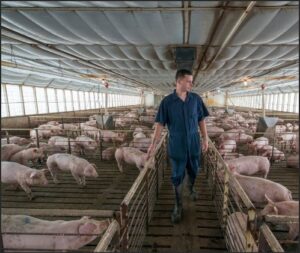
by James A. Bacon
Look, I consider myself a China hawk. I detest the communist regime, I consider China a threat to the global order, I think the U.S. should commit to defend Taiwan, and I support measures to crack down on China’s cyber theft and unfair trade practices. But there’s one thing I don’t get. I don’t understand the agitation about the Chinese buying American farmland.
The General Assembly appears to be poised to pass a bill that would prohibit “foreign adversaries” from acquiring or transferring agricultural land in Virginia — a ban that would extend to “meat, dairy, and poultry products; nuts, tobacco, nursery, and floral products.”
According to Virginia Public Media, the Chinese own 14,000 acres of Virginia farmland. (I expect most of this acreage can be attributed to Smithfield Foods, the pork products company.)
So what? How would Chinese ownership of Virginia floral greenhouses, or pig farms for that matter, constitute a danger to U.S. economic, military or political security?
Do the patrons of this legislation fear that Chinese intelligence operatives might purchase farms or timberlands close to U.S. military facilities and spy on them? That can’t be the case. If the Chicoms want to spy on us, they have ample means — cyber espionage, satellites, high-altitude balloons — to extract secrets. And if they wanted to engage in, say, electronic eavesdropping on a military base, there’s nothing in the bill to stop them from buying, oh, I don’t know… a house nearby.
Do the patrons of the bill fear that the Chicoms can use their control over agricultural lands to threaten our food supplies? That strikes me as absurd. As VPM points out, foreign firms and individuals own about 3% of U.S. farm and timberland, and the Chinese own about 1% of that. Chinese ownership is inconsequential, and there is no sign of that changing.
Even if Chinese firms owned as much as half of American agricultural lands, it’s not as if President Xi could turn off the spigot from Beijing. You see, the corn, wheat, pigs, cattle, apple trees, flowers, pine trees, etc., are here, not there. In the worst-case eventuality of war between our nations, we have all the leverage. We can shut off exports or, in extremis, expropriate Chinese property.
Indeed, one could make the argument that we should encourage the Chinese to purchase American farmland. The more the Chicoms depend upon the U.S. as a source of food supply — think Smithfield Foods exports of pork products to China — the more they are vulnerable to us turning off the spigot to them.
I do think it’s worthwhile to protect ourselves from predatory Chinese practices, but let’s target actual or potential abuses, not imagined ones. Banning the use of TikTok on phones issued by the Commonwealth of Virginia, for instance, seems like a marginally useful idea.
An even better idea is to gain a better understanding of influence the Chicom government exercises in Virginia universities through various grants, programs, and student enrollment. In particular: what disciplines are Chinese nationals studying, and what are they doing with that knowledge? Do they return to China or do they seek employment here? How many are enticed by the American way of life and reject the communist government, and how many remain loyal and cooperate with Chinese intelligence? What role, if any, do Virginia-educated Chinese nationals play in aiding technology theft?
But cracking down on technology theft is hard. It requires resources, and it incurs the risk of racial profiling. By contrast, banning the sale of agricultural land to “foreign adversaries” is easy. No resources needed, no thought required. At the end of the day, I don’t see the ban doing any great harm either. It just seems a useless gesture.
As always on such matters, I refer readers to The Rise of China, Inc. by Old Dominion University professor Shaomin Li, who describes China’s aims and tactics in authoritative detail. By the way, has anyone consulted Li regarding the efficacy of the anti-Chicom legislation? It might be wise to query a bona fide expert.

Leave a Reply
You must be logged in to post a comment.